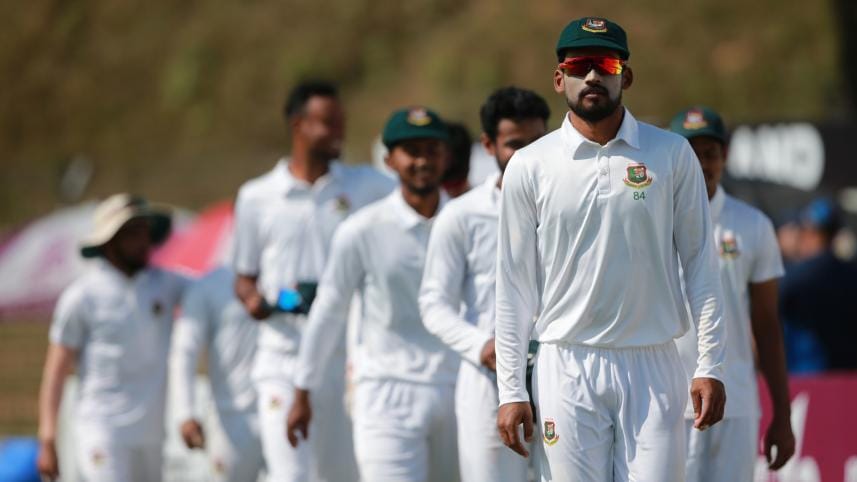Thought process threatens progress

The year 2023 has been a 'colourful' one for Bangladesh, in the most literal sense, as they have spent most of their time playing in the red-and-green jersey and have donned the all-white one on only four occasions.
Despite the low number of games, the outgoing year has been phenomenal for the Tigers -- with three wins in four Tests, their best in terms of winning percentage in the format in a calendar year.
However, the record could have been perfect had the team not shot itself in the foot with a misguided approach.
The first of the three wins came against Ireland in April at the Sher-e-Bangla National Stadium in Dhaka followed by a thumping 546-run win over Afghanistan in June at the same venue.
The last and the most significant of the victories came against New Zealand in Sylhet in November-December, when the Najmul Hossain Shanto-led team ended Bangladesh's winless streak against the Kiwis at home with a 150-run win.
With three wins in the kitty, Bangladesh had the opportunity to make it four-in-four in Tests with a win in Dhaka in the second Test against New Zealand.
Heading into the match, the momentum was with the Tigers. They had defeated the visitors in a sporting pitch at the Sylhet International Cricket Stadium and were going to play in Mirpur, where they had won their previous two Tests this year.
But in that match, the hosts fell to the spin trap they had set up for the visitors and suffered a four-wicket defeat.
The outcome, without a doubt, put a damper on what could have been Bangladesh's first perfect year in Test cricket.
But more than that, the reaction of the captain and other players, justifying the Mirpur pitch, which was later given a demerit point by the ICC and labelled underprepared, in the name of taking home advantage presented an even more worrying picture.
The tendency of preparing rank-turners for Tests at the SBNS first began during Chandika Hathurusingha's first tenure as the Bangladesh head coach and this ploy earned wide acceptance after first-ever Test wins over England in 2016 and Australia in 2017.
But since then, the Tiger's record at their home of cricket has been quite poor, with no victory over leading sides.
Still, the narrative of Bangladesh needing to prepare pitches where the ball turns significantly from Day One is still widely accepted, especially in Mirpur.
Against Ireland and Afghanistan, the cricket board perhaps thought they did not need to prepare a turning track and the hosts had no real trouble in winning those bouts.
The match against Afghanistan was particularly interesting as that match went down to the final day, a rarity in Mirpur, and 20 of the 34 wickets that fell in the match were taken by the fast bowlers.
Against New Zealand, the management, desperate to win, prepared the sort of pitch that gave them success six to seven years back, and the ploy backfired.
After the defeat, a soul searching was in order for the think tank -- a realisation that preparing spin-friendly tracks in the pursuit of becoming home-track bullies is undermining the team's growth in the past few years and also stagnating the development of many young faces with great potential in the current red-ball team.
Instead, the team seemed even more adamant in their approach, hinting that they would gladly do it again in the future.
And such thinking right before Bangladesh's busiest ever year in Test cricket is very dangerous for the team.
As per the ICC FTP, Bangladesh will play 14 Tests next year, two each against Sri Lanka, Zimbabwe and South Africa at home, and a couple against Afghanistan, Pakistan, India, West Indies, respectively away from home.
If Bangladesh continue searching for short-term success, the scenes of the second Test against New Zealand could repeat next year which might deliver momentary gain but cause more damage in the long run.



 For all latest news, follow The Daily Star's Google News channel.
For all latest news, follow The Daily Star's Google News channel.
Comments